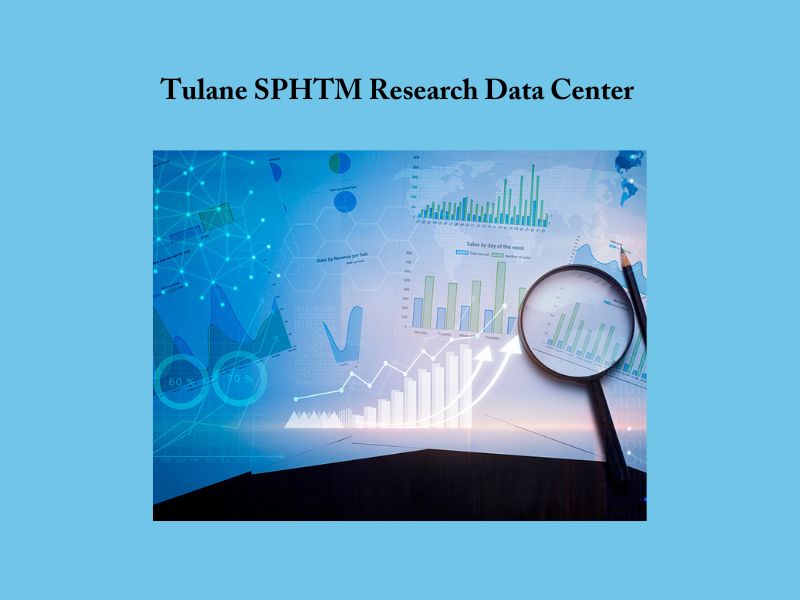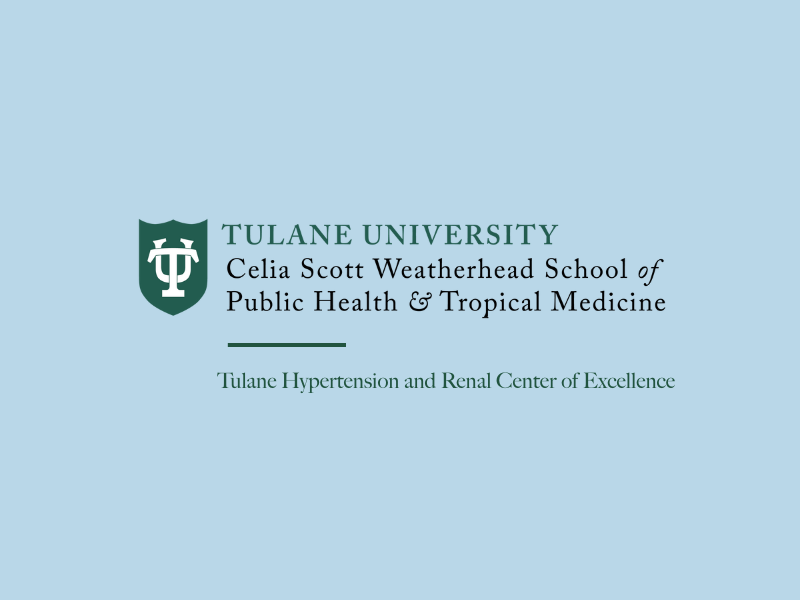Research Centers
Research Centers help to maximize the efforts of faculty who are researching similar or complementary issues. Through a variety of grants and other funding instruments, research centers are focused on broad or sometimes more narrow topics, and can be found across the school or specific to one department. Centers are often partnerships with other schools and entities, and many are very active within communities here in New Orleans.
Featured Research Centers
The Tulane WSPH Research Data Center (RDC) specializes in the areas of data capture, management, security, and storage and seeks to establish Tulane as a global leader in these highly practical areas to facilitate large interdisciplinary research proposals and meet the demands for enhanced scientific rigor and transparency requirements.
The Tulane University Translational Science Institute (TUTSI) is a university-wide research center that aims to promote and increase high-impact clinical, translational, and implementation research at Tulane University and Louisiana.
Composed of faculty from multidisciplinary fields, this center is dedicated to investigative efforts, patient care, and public education in the crucial areas of hypertension and kidney diseases. Emphasis is placed on translating basic science discoveries to the clinical arena.
All Research Centers
- Center for Applied Environmental Public Health (CAEPH): translates applied research to practice through education and training for environmental health and public health professionals using distance education.
- Center for Applied Malaria Research and Evaluation (CAMRE): Established in 2013, CAMRE’s mission is to maximize the public health impact of malaria programs by applying innovative and interdisciplinary research tools to solve current and expected challenges in malaria elimination, with ongoing applied malaria research in Democratic Republic of Congo, Haiti, Zambia, Mali, Tanzania, Ethiopia, and Zanzibar.
- Center for Emerging Reproductive Perinatal Epidemiology (CERPE): facilitates collaborations with colleagues across the globe to advance research on reproductive perinatal epidemiology.
- Center of Excellence in Maternal and Child Health: Tulane CEMCH seeks to improve the health of women, infants, children, youth and their families through the development of the MCH workforce.
- Center for Reproductive Health Policies and Programs: The Center for Reproductive Health Policy and Programs aims to increase access to quality reproductive health services in low—and middle-income countries. Through a continuous cycle of applied research and evidence-based programming, the Center works closely with government, NGO partners, and other stakeholders to achieve this objective.
- Center for Studies of Displaced Populations (CSDP): supports several studies focused on individuals and families in transition, with the principal one being "Demographic and Health Disparities in Recovery from Hurricane Katrina: KATRINA@10.”
- Center for Health Equity in Latin America (CHELA): The Center for Health Equity in Latin America (CHELA) engages Tulane University faculty, students, and global partners to lead innovative research initiatives that examine health equity in Latin America and the Caribbean, provide visibility for the region’s under-recognized health inequities, and inform policies to address the needs of the region’s impoverished and marginalized populations.
- Health Equity and Access Lab: The Tulane Health Equity and Access Lab (HEAL) conducts field experiment-based research focused on measuring the magnitudes and mechanisms of unequal access to healthcare appointments in the United States.
- Center for Youth Equity: The Center for Youth Equity (CYE) is framed within anti-racist and anti-oppressive constructs that aim to address the root causes of youth exposure to violence and acknowledge the ways systemic and structural violence manifest as lower socioeconomic opportunities, disinvestment in schools and neighborhoods, and discriminatory law enforcement that overwhelmingly affect Black and African American communities.
- Health Office for Latin America (HOLA): Building upon Tulane's historical ties to Latin America, the SPHTM maintains a health office in Lima, Peru, to facilitate research in South and Central America and Mexico.
- Health Systems Analytics Research Center (HSARC): is a collaboration between the Louisiana Public Health Institute and the Tulane University Department of Health Policy and Management, and offers the capacity to design, collect, and analyze statistical data and the strategic expertise to define how those analytic outcomes can be applied given the context of our multi-level health care system.
- Highly Vulnerable Children's Research Center: The HVC-RC’s goal is to provide empirical evidence that can effectively guide programming and policy for children in difficult circumstances.
- The Mary Amelia Center for Women's Health Education Center (MAC): seeks to reduce inequities in women’s health and enhance health and well-being through community building for health, interdisciplinary research (health promotion and determinants research), advocacy, and leadership development.
- MEASURE Evaluation Project: MEASURE Evaluation was a partnership among Carolina Population Center at the University of North Carolina at Chapel Hill, Palladium Group, ICF, John Snow, Inc., Management Sciences for Health, and Tulane School of Public Health and Tropical Medicine. Visit the site link to learn more about the work in data and its impact.
- Society, Health, and Racial Equity Lab (SHARE): serves as a forum for research on health and social equity, and the role of racism in generating and perpetuating injustices in health. As part of this work, we examine multiple ecological levels of influence on health—ranging from broader social forces to the cellular level—using a developmental lens.
- Southern Center for Maternal Health Equity: The center aims to address maternal morbidity and mortality, particularly among Black women in the Gulf South, by testing community-prioritized strategies, strengthening research capacity in Louisiana and Mississippi, and establishing a maternal health research center within community partnerships
- Telemedicine: Disparities in Access and Quality (TDAQ): The Telemedicine: Disparities in Access and Quality (TDAQ) study is comprised of a series of analyses seeking to determine the impact of the rapid transition to telemedicine in the wake of COVID-19 on Medicaid beneficiaries in Louisiana.
- Tulane Center for Lifespan Epidemiology Research (CLER): The mission of CLER is to discover and develop knowledge to maintain health and prevent disease in individuals and populations across the lifespan. CLER brings together population research expertise ranging from maternal and child health to genetics and epigenetics, chronic diseases (especially cardiovascular to aging outcomes.
- Tulane SPHTM Research Data Center (RDC): RDC seeks to establish Tulane as a global leader in data management and analysis to facilitate large interdisciplinary research proposals and meet the demands for enhanced scientific rigor and transparency requirements.
- Tulane Health Equity Institute: The institute is comprised of centers, research projects, and individual researchers who explore unjust patterns in the distribution of diseases that are avoidable and preventable, working to enhance human health through engagement of disadvantaged communities and populations and to serve as a resource for education and training.
- Tulane Hypertension and Renal Center of Excellence: Composed of faculty from multidisciplinary fields, this center is dedicated to investigative efforts, patient care, and public education in the crucial areas of hypertension and kidney diseases. Emphasis is placed on translating basic science discoveries to the clinical arena.
- Tulane Office of Global Health: The mission of the Tulane Office of Global Health (OGH) is to foster interdisciplinary, collaborative research opportunities for faculty across Tulane University, and to promote global health research training opportunities for Tulane students. The Tulane Office of Global Health is a university-wide center, with representation from across Tulane University, including all of the schools and colleges: Newcomb-Tulane College, the School of Architecture, the A.B. Freeman School of Business, the School of Liberal Arts, the School of Medicine, the School of Professional Advancement, the School of Public Health and Tropical Medicine, the School of Science and Engineering, and the School of Social Work. Additionally, the Office of Global Health has collaborative relationships with international organizations from a variety of countries, including Argentina, China, the Democratic Republic of Congo, Honduras, Peru, and Zambia.
- Tulane Obesity Research Center (TUORC): TUORC is a university-wide group of investigators dedicated to excellence in obesity research using systems epidemiological and clinical approaches. A particular focus of the center is a greater understanding of the complex interactions of human genomics, metabolomics, epigenomics, and gut microbiome with diet and lifestyle in determining obesity risk and weight management in the context of population cohorts and intervention trials.
- Tulane Personalized Health Institute (TPHI) - The institute seeks to solve vexing research problems closely related to interpersonal variability and population disparity in health, and translate the findings to disease prevention, diagnosis, and treatment.
- Tulane University Office of Health Research: The OHR is a community-based clinical research facility located in downtown New Orleans and co-directed by Drs. Jiang He and Jing Chen. The OHR is equipped with a clinical laboratory, examination rooms, conference rooms, a dietary interview room, an intervention room, a kitchen, secured data storage rooms, a freezer room, and staff office space. It houses several NIH-funded studies.
- Tulane Translational Science Institute (TUTSI): The Tulane University Translational Science Institute (TUTSI) is a university-wide research center that aims to promote and increase high-impact clinical, translational, and implementation research at Tulane University and Louisiana.
- Vector Borne Infectious Disease Research Center: The multi-disciplinary research includes diverse disciplines and approaches, e.g., biochemistry, biostatistics, bioinformatics, chemistry, entomology, epidemiology, immunology, mathematical modeling, microbiology, molecular biology, parasitology, and structural biology.
- Violence Prevention Institute (VPI): Tulane functions as a hub for supporting and expanding multidisciplinary violence prevention-related research, teaching, community programs, and advocacy efforts across Tulane University, New Orleans, and beyond.



